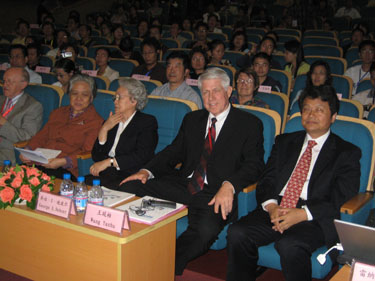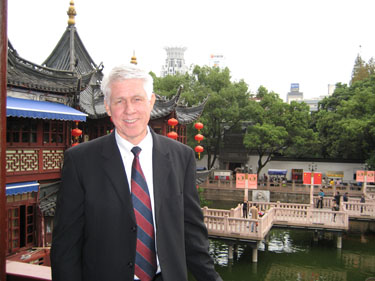
An electronic newsletter for the science education community
Chinese Educators, U.S. Publishers Look to Project 2061
Deputy Director George DeBoer shares science standards expertise
In its 20 years of promoting science literacy, AAAS Project 2061 has shared its vision of standards-based curriculum, assessment, and instruction with educators across the U.S., including those who design and publish science textbooks. Project 2061 has also collaborated with and advised educators around the world—in Asia, Africa, Europe, and South America.
This past fall, Deputy Director George DeBoer continued Project 2061's work with both U.S. publishers and international educators through two invited talks. He traveled to Shanghai, China, for a forum on science literacy, and he participated here at home in a summit sponsored by the Association of American Publishers. At both events, DeBoer discussed Project 2061’s current efforts to develop the assessments and instructional resources needed to help students achieve the knowledge and skills specified in K–12 science content standards.
Sharing Expertise in Shanghai
At the invitation of the Shanghai Association for Science and Technology (SAST), Project 2061's George DeBoer participated in the 2007 Shanghai International Forum on Science Literacy of Precollege Students last October. Teachers and experts from scientific associations, primarily from China, attended the event and learned from a variety of presentations and workshops about innovations and practices in promoting science literacy among precollege students. Also participating were officials from La main à la pâte (LAMAP), a program of the French Academy of Sciences that promotes primary science education.
Joining SAST as organizers of the 2007 Shanghai International Forum were the Children and Youth Science Centre of the China Association for Science and Technology (CAST), the Shanghai Municipal Education Commission, and the Luwan District Government of Shanghai. The annual Forum is part of a national plan in China to improve science literacy, the objectives for which are summarized in a document called the “Outline of the National Action Program for Scientific Literacy of All Chinese Citizens (2006-2010-2020).”

-
From left to right: Yves Quere, vice president of the French Academy of Sciences; Wei Yu, vice president of the China Association for Science and Technology (CAST); Xie Lijuan, vice chairman of the CPPCC Shanghai Committee and director of the Shanghai Municipal Education Development Foundation; George DeBoer, deputy director of AAAS Project 2061; and Wan Yanhu, deputy director of the Youth Centre of Science and Technology Education at CAST.
In addition to Project 2061, other groups at AAAS have worked with Chinese educators. All of these collaborations with China got a boost last year when a delegation led by AAAS Chief Executive Officer Alan I. Leshner signed agreements with Chinese science and technology organizations to collaborate on a range of publishing and education projects. Among those projects was an agreement between AAAS and CAST to translate and post on the CAST Web site resources developed by Project 2061 (see AAAS News coverage). Working with China's Popular Science Press, CAST has already played a role in publishing Chinese translations of Science for All Americans, Benchmarks for Science Literacy, Atlas of Science Literacy, and other Project 2061 books.
Even though China and the U.S. share a strong interest in science literacy, DeBoer notes that specific aspects of science literacy in China are dependent on its own cultural traditions.
“Looking at the Chinese concept of science literacy and their national program to achieve it, their approach differs somewhat from what we in the U.S. think of as science literacy. Although there are similarities, there are also differences. In China, there is more of a focus on practical issues, such as public health and sanitation, and also a greater focus on the kind of society that the educational system is supposed to create,” says DeBoer. China's “Action Program” document, for example, emphasizes that raising the scientific literacy of citizens is important not only for “strengthening their capability to acquire and apply scientific and technological knowledge,” but also for “improving their life quality” and for “building a socialist harmonious society.”
“You see these differences in other newly industrialized or developing countries as well,” DeBoer adds. “In India, for example, there is more of an effort to accommodate traditional beliefs with modern science, and a greater focus on the objects and phenomena that are important in the everyday lives of people.”

-
George DeBoer at the Yuyuan Garden and Bazaar,
a classic water garden in Shanghai.
Despite their different cultural context, DeBoer’s Chinese colleagues have taken a keen interest in Project 2061's focus on defining a coherent set of content standards and using them to guide science instruction. In his presentation at the Shanghai forum, “Promoting Standards-Based Assessment and Instruction,” DeBoer brought the Chinese audience up to date on Project 2061's ongoing work to provide teachers, researchers, and curriculum developers with high-quality assessments and instructional resources that are aligned to content standards.
To read more about DeBoer's collaborations with international educators, see “Science Literacy in a Global Context.”
Providing Guidance to School Publishers
Project 2061’s development of standards-based science resources also framed DeBoer's presentation to U.S. school publishers. He was among the experts who met in Northern Virginia last October at the “Summit on Math and Science Education: From Policy to Product to Practice” organized by the School Division of the Association of American Publishers (AAP).
The summit brought together leaders from government, the private sector, and academia to share the latest and best thinking in math and science education in order to help publishers create better instructional materials and standardized tests. About 180 attendees heard discussions of panels addressing topics such as National Perspectives on Math and Science Education; Changing Math and Science Standards in the States; Assessment; and Math and Science for All.
The Assessment panel, on which DeBoer participated, discussed the role and design of math and science assessments, covering key policy requirements from the U.S. Department of Education; the different roles that the National Assessment of Educational Progress (NAEP) and formative assessments can play as measures of students' proficiency in math and science; and the challenges of developing assessments that meet requirements in the states. The other panelists were Sue Rigney, an assessment specialist in the Office of Elementary and Secondary Education at the U.S. Department of Education, and Sharon Robinson, President and CEO of the American Association of Colleges for Teacher Education. Larry Snowhite, Vice President for Government Relations at Houghton Mifflin, moderated the panel.
DeBoer discussed Project 2061’s development of tools and resources to support effective standards-based assessment and instruction. He explained how, because the standards tend to be under-specified for purposes of guiding assessment development, Project 2061 researchers begin their item development process by writing clarification statements to state with much greater precision what students should know and be able to do.
He then described in detail Project 2061’s effort to create a bank of middle school science assessment items that are precisely aligned with national content standards. The bank of items can be used by both classroom teachers and educational researchers or as a model of close alignment by test developers. Each assessment item is the result of a two-year development cycle. DeBoer and his team clarify the learning goals, review the research literature on student learning, and design items that are content-aligned and that use misconceptions as distractors. Researchers then pilot test each item, organize formal evaluations by teams of external reviewers, and field test each item using a national sample, revising items at each stage along the way. Finally, DeBoer shared what the assessment results are revealing concerning what middle school students know about the ideas in the national science standards.
At the end of the presentation, DeBoer asked attendees to think about how researchers and implementers could work more closely together. Project 2061, for example, is a research and development group that currently does not have an implementation arm, and many publishing companies do not have a research arm. Closer collaborations between such groups could be beneficial to both and to the larger science education community.
Learn more about AAP, the principal trade association of the book publishing industry. AAP’s School Division members publish most of the instructional materials and assessment tools commercially available in America’s schools from preschool through 12th grade.
# # #
For more information, please contact:
Deputy Director: Dr. George DeBoer, (202) 326-6624



